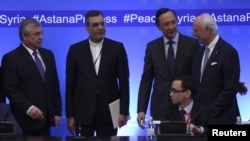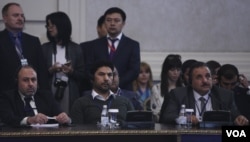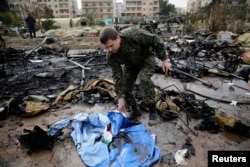Russia, Turkey, and Iran agreed to a Moscow-proposed deal Thursday to establish so-called “de-escalation” zones in Syria to try to end the six-year conflict in the country.
Representatives of the three Syria cease-fire guarantor nations signed a memorandum to that effect at the end of the latest round of peace talks in Astana, the capital of Kazakhstan.
The proposal calls for taking measures to reduce fighting in four designated areas of Syria where rebels not associated with Islamic State terrorists control significant territory.
Progress on peace?
Despite what appears to be progress after four rounds of talks in Astana, there remains a great deal of skepticism about whether such a deal can be implemented.
No details were released on how the three countries, which support different sides in the conflict, would attempt to end the violence. And while the Syrian government voiced its support for the agreement, neither Damascus nor the Syrian rebels signed any deal.
Members of the Syrian opposition delegation in Astana walked out of the meeting Thursday, shouting their dissatisfaction with Iran being part of the talks. The head of the opposition delegation, Mohammed Alloush, did not attend the second day of talks.
The rebel delegation suspended its participation on Wednesday over ongoing airstrikes but members returned to the table for the final day of talks.
While Russia and Iran support the government of Syrian President Bashar al-Assad, Turkey backs the rebels.
Turkey, Russia agree on Syria?
But during Turkish President Recep Tayyip Erdogan’s joint press briefing with Russian President Vladimir Putin in Sochi Wednesday, Erdogan concentrated on condemning terrorism rather than Assad’s government.
“We never drew distinctions between terrorist organizations, whether (the Kurdish) YPG, ISIS (Islamic State) or al-Qaida. They are all the same to us,” said Erdogan. “They all feed on blood, chaos and tears. It is our common responsibility to eradicate these terrorist organizations.”
And while Erdogan condemned a suspected chemical weapons attack early last month on civilians in Khan Sheikhun, and said Putin agreed those responsible must be punished, he did not call out Damascus as the culprit.
Despite an earlier fallout over Syria, Putin declared a returning to normal cooperation with Turkey and expressed confidence they could set up “de-escalation” zones.
“As guarantors of the cease-fire, Turkey, Iran, and Russia, will do their best to ensure that these mechanisms get better and are effective. We will support this proposal,” said Putin.
Much work ahead
But analysts say there is much yet to be negotiated on Syria and remaining differences between Turkey and Russia.
“The Russian concept differs from that of both Turkey and the United States,” says Alexander Shumilin, head of the Center for the Analysis of Middle East Conflicts at the Institute for U.S. and Canadian Studies of the Russian Academy of Sciences.
“What Russia suggests is aimed at the reduction of the level of tension by maintaining control over certain territories by the main international players like Russia, Iran and Turkey. The Turkish view is to create no-fly zones as well as territories to collect refugees. They could be controlled solely by international organizations,” Shumilin said.
Syrian rebels have said they would not accept Russian or Iranian monitors on the ground and voiced doubts that the Syrian government or its Russian backers would stop bombing them. Damascus has rejected previous suggestions of establishing “no-fly” zones in Syria. Putin said the grounding of aircraft would be conditional.
“With regard to a no-fly zone, if this is a de-escalation zone, then aircraft will not operate there either, provided that these zones show no sign of military activity,” Putin said at the joint briefing Wednesday.
US participation
The United States and some Arab countries are also backing rebel groups that want to overthrow Assad. The U.S. sent its highest-level official yet to observe the talks in Astana - Acting Assistant Secretary of State Stuart Jones.
The Kremlin’s plan is similar to calls by U.S. President Donald Trump for “safe zones” in Syria, and Putin said Trump seemed to support the idea when the leaders talked Tuesday by phone.
More details, concerns and objections are expected to be aired in the coming weeks.
Kazakhstan’s Foreign Ministry said the next round of expanded Syria talks in Geneva is set for late May while the next Russia, Turkey, and Iran-brokered Astana meeting is set for mid-July.
Olga Pavlova contributed to this report.



